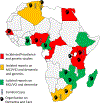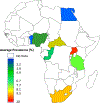Dementia in Africa: Current evidence, knowledge gaps, and future directions
- PMID: 34569714
- PMCID: PMC8957626
- DOI: 10.1002/alz.12432
Dementia in Africa: Current evidence, knowledge gaps, and future directions
Abstract
In tandem with the ever-increasing aging population in low and middle-income countries, the burden of dementia is rising on the African continent. Dementia prevalence varies from 2.3% to 20.0% and incidence rates are 13.3 per 1000 person-years with increasing mortality in parts of rapidly transforming Africa. Differences in nutrition, cardiovascular factors, comorbidities, infections, mortality, and detection likely contribute to lower incidence. Alzheimer's disease, vascular dementia, and human immunodeficiency virus/acquired immunodeficiency syndrome-associated neurocognitive disorders are the most common dementia subtypes. Comprehensive longitudinal studies with robust methodology and regional coverage would provide more reliable information. The apolipoprotein E (APOE) ε4 allele is most studied but has shown differential effects within African ancestry compared to Caucasian. More candidate gene and genome-wide association studies are needed to relate to dementia phenotypes. Validated culture-sensitive cognitive tools not influenced by education and language differences are critically needed for implementation across multidisciplinary groupings such as the proposed African Dementia Consortium.
Keywords: Africa; Alzheimer's disease; consortium; dementia; epidemiology; genetics; neuropathology. biomarkers; precision medicine; vascular dementia.
© 2021 the Alzheimer's Association.
Conflict of interest statement
CONFLICTS OF INTEREST
All authors have no conflict of interest related to this article.
Figures


References
-
- Corriveau RA et al. The Science of Vascular Contributions to Cognitive Impairment and Dementia (VCID): A Framework for Advancing Research Priorities in the Cerebrovascular Biology of Cognitive Decline. Cellular and molecular neurobiology 36, 281–288, doi:10.1007/s10571-016-0334-7 (2016). - DOI - PMC - PubMed
-
- Prince M, Guerchet M & Prina M The Global Impact of Dementia: 2013–2050. (2013).
-
- WHO. Global action plan on the public health response to dementia 2017 – 2025. (2017).
-
- Prince M et al. The Global Impact of Dementia - An analysis of prevalence, incidence, cost and trends. (London, 2015).
Publication types
MeSH terms
Substances
Grants and funding
LinkOut - more resources
Full Text Sources
Medical
Miscellaneous

